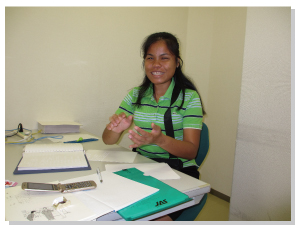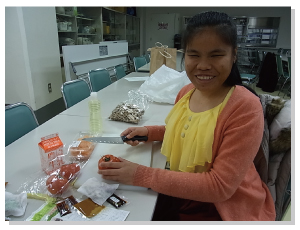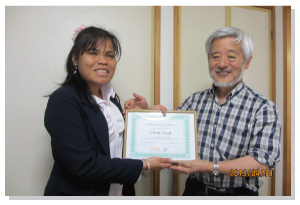- HOME
- Alumni News
- Nhim Sinat (14th trainee)
- Sinat's Final Report
Sinat's Final Report
Confidence—Something the Training in Japan Has Brought to Me—
1. Self Introduction
My name is Nhim Shinat. I am from Cambodia. I tasted so many wonderful foods in Japan, including curries, fried chicken and fried noodles. My favorite food is vegetable stir-fry, and my favorite drink is mocha coffee and I had it every day.
2. 10-Month Experience
1) Japanese class
Starting in September, I studied Japanese for three months. I was alright with grammar and conversation, but I found reading Braille very difficult. There are so many characters in Japanese, and so many ways to pronounce them. I was able to read simple characters but not complicated ones. I worked hard, however. My Japanese teachers and Braille teachers were always very supportive of me, and were all very kind. I liked my teachers. During the Japanese training, I also learned how to swim. At first I could only swim 7 meters, and also swallowed a lot of water. But after much practice I was able to swim 25 meters.

2) Group Training
We had a group training program in December, in which we studied support systems, leadership and abuse towards people with disabilities. It was the first time I learned about different kinds of disability. Until then I had had some knowledge about visual impairment, but I did not know how to support people with other disabilities. I think that Japan’s support system for people with disabilities is amazing. In my country there are no such support systems. If someone with a disability wishes to buy an assistive device, she has to buy it by herself, as the government has no subsidies for people with disabilities. There is no personal assistant service available, either. During the group training, I found abuse prevention workshop particularly interesting. The most interesting was roll-playing. Masako-san and Nasu-san were very good at roll-playing, which made it easy for me to understand the contents of the two-day workshop. The most difficult program was leadership skills development training. We were given some pictures to look at together. For example, we looked at a picture of a Japanese character, and discussed what message might be embedded. But the picture looked to have so many implications that it was difficult to examine all the possibilities and unite our opinions.

3) Home-Stay
In the New Year, I went to Kyoto for the home-stay program. With my host family, I visited many places and enjoyed delicious food. I also wore a kimono. Kimono was very heavy and took a long time to put on. My host family and I took many pictures. My host father also taught me how to cook curry. The home-stay program was interesting and fun. Everyone was kind and I loved my host family.
4) PC Training
After the home-stay program, I studied personal computing at the At Ease computer school. I learned about Microsoft Office and HTML. The most interesting and also the hardest to learn was HTML. I learned about how to create a website using HTML. I worked very hard, because I wanted to be good at HTML.
5) Skiing
In January I went to Niigata for the ski training. There was a lot of snow in Niigata. I played with snow for the first time in my life. In the beginning I fell over so many times, but my instructor always helped me get up. By the end of the training I got better at skiing. Skiing was so much fun, and if I have a chance, I would like to go skiing again.
6) Hachioji Support Center of Hearing and Visual Disabilities
At the Hachioji Support Center of Hearing and Visual Disabilities, I studied about independent living programs, how to support people of different disabilities, and about peer counseling. I found peer counseling most intriguing. I also experienced living alone, and cooked myself meals. In my country it is difficult to live alone, but it was enjoyable to do many things alone.
7) Nippon Lighthouse Welfare Center for the Blind
The Nippon Lighthouse Welfare Center for the Blind consists of several facilities for persons with visual impairment, including the Rehabilitation Center and the Information & Culture Center. In my first week, I went to their Rehabilitation Center in Osaka. I experienced sports, Japanese calligraphy called Sumiji, and karaoke. I also made friends with many people. When they had time, they would teach me Osakan dialect such as “Ojoshimasse” (meaning: it’s bothersome), “Nandeyanen” (meaning: why), and “Akande” (meaning: that’s no good). Everyone was kind to me. I then had a training program at the Information and Culture Center, from where I visited many other places, including a blind school in Kobe to meet an English teacher. I asked the teacher many questions, and the teacher shared with me ample information including her experiences of teaching. I then visited the guide dog center to have training. I learned how to walk with a guide dog. I also learned about DAISY and had mobility training.
8) NPO. Co. Rokuseikai Hamamatsu Workshop with the Disabled-WITH
At the WITH, I learned about work carried out by people with disabilities and how to make a white cane. I experienced many different types of work. Everyone at the WITH was very kind.
9) Assistive Technology Development Organization (ATDO)
I had a DAISY training program at ATDO. It included how to create a variety of DAISY software, such as full-text, full-audio DAISY, audio DAISY and text DAISY. I understood well how to create DAISY, and created many texts.

10) Mainstream Association
At the Mainstream Association I had many interesting experiences. One of them was chatting with my friends without sleep throughout the night. I even chatted with them until six in the morning. I also participated in their mini TRY. I walked 35km with everyone and yelled our slogan in a chorus. I also experienced drinking a fair amount of alcohol at the farewell party they organized for us. The alcoholic drinks were sweet and tasty. I drank so much that I could not walk alone. I made many friends at the Mainstream. Everyone had a good sense of humor.
11) Special Needs School for the Visually Impaired, University of Tsukuba
I had my last training at the Special Needs School for the Visually Impaired, University of Tsukuba. I attended many classes. The classes I attended are: English, home-making, massaging and music. In the English class I learned many good teaching methods. There were many interesting classes but the most interesting class was music. The students were very good at the piano, and it was a good training program for me.
3. Changes that happened
When living in Cambodia, I wanted to visit various places but I was too scared to do so alone. I also had many things I wanted to do but I had given them up. At school, my teacher would ask students a number of questions. When other students did not have answers, I wanted to raise my hand and offer an answer, but I was scared and lacked confidence. So I never raised my hand.
I also hated having meals with my friends who could see. Every time I held a spoon in front of my friends I would get a little nervous, because I would often spill rice and other food on my clothes when I ate, and because I could never see it, I was very embarrassed. Not being able to see was something terrible and saddening, so I always thought I could never do anything. This made me very dependant on my friends and teachers. I never thought about doing my errands by myself, or gave much thought to my own problems. I also tended to give up on a thing very quickly. Because I could not do what I wanted to do, I always felt darkly and was always angry.
However, I experienced many things in the 10 months in Japan, which gave me a lot of confidence in me. I was able to do a variety of things by myself and it changed the way I think. First, my own perception of my disability changed. In Japan, people with visual impairment do everything. They work alone and they travel alone. Seeing this has changed the way I think. In Japan, I had many ideas and I was able to communicate them to everyone. I also thought a lot about my own problems. For example, I was never good at time management. If I had free time I would just spend it on fun things. But in Japan, time management is very important. Independent living is only possible when one is both having a fun and is busy. After understanding this, my idea about time management has changed.
I visited many places, saw many things and did many enjoyable things, so I felt better and became capable controlling my anger. Sometimes the training contents were difficult, but it gave me an opportunity to think thoroughly by myself and stick it out till the end. In Cambodia, I used to lose patience and give things up quickly whenever I could not immediately get an expected outcome. In Japan, however, I worked hard because I knew that without hard work here I would never become a good leader in Cambodia.
In Japan, I became a new Sinat. I am so happy because I had many experiences that changed me in a variety of ways. Because I have more confidence in myself, I speak more loudly now.
4. After going back to Cambodia
When I go back to Cambodia, there are four things I want to do. First I want to study more at a university. Second, I want to work on peer counseling at the independent living center. Third I want to change the center for the blind. I would like to tell what I have learnt in Japan to people living at other centers. Fourth, I have a goal for my future – I want to become an English teacher. I would like to teach English to university students with and without disabilities.
5. A word of thanks
I would like to express my gratitude to my friends, and the staff people of the Toyama Sunrise and the JSRPD, who were very kind to me and looked after me while I was in Japan. It was so heart-warming. Lastly, I would like to say thank you to my Japanese teachers, everyone at my training destinations, everyone at the JSRPD as well as the Duskin AINOWA Foundation.




